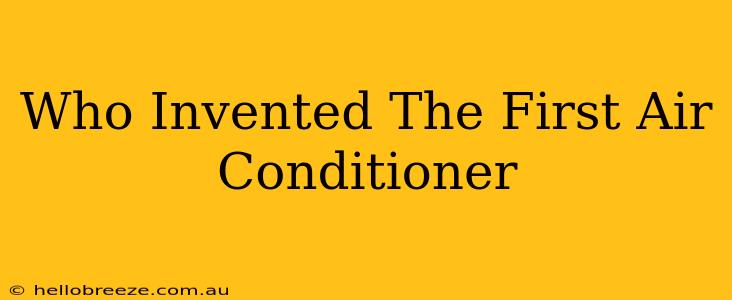The invention of the air conditioner wasn't a single "eureka!" moment, but rather a process of evolution and refinement. While several individuals contributed to its development, Willis Haviland Carrier is widely credited with inventing the first modern electric air conditioning system.
Before Carrier: Early Attempts at Cooling
Long before electrically powered air conditioners, people sought ways to beat the heat. Ancient civilizations employed various methods, including:
- Natural ventilation: Strategic building design using breezes and shaded areas.
- Evaporative cooling: Using water to cool the air through evaporation – a principle still used in some modern systems.
- Ice: Wealthy individuals used ice harvested in winter to cool their homes during summer months.
These methods were effective to a degree, but they were limited in their reach and efficiency. They certainly didn't offer the consistent, controlled cooling we expect today.
Willis Carrier and the Birth of Modern Air Conditioning
In 1902, Willis Haviland Carrier, a young engineer working for the Buffalo Forge Company, solved a critical problem for the Sackett-Wilhelms Lithographing & Publishing Company. Their printing process was highly sensitive to humidity and temperature fluctuations, causing significant issues with the quality of their work.
Carrier designed and built a machine that effectively controlled both temperature and humidity. This wasn't simply a fan blowing cool air; it was a sophisticated system using refrigeration principles to dehumidify and cool the air. This invention marked a significant turning point. It was the first practical air conditioning system capable of consistent, reliable performance.
Carrier's invention wasn't just a technological marvel; it was a game-changer. His system paved the way for:
- Improved industrial processes: Manufacturing and other industries became more efficient and productive.
- Enhanced comfort: Air conditioning began its journey towards becoming a staple in homes, offices, and public spaces.
- Public health improvements: Reduced humidity and temperatures lead to better public health outcomes.
Beyond Carrier: The Ongoing Evolution
While Carrier's invention is foundational, air conditioning technology continued to evolve. Subsequent innovations focused on:
- Efficiency improvements: Reducing energy consumption and environmental impact.
- Smaller and more affordable units: Making air conditioning accessible to a wider range of consumers.
- Advanced features: Incorporating smart technology, improved filtration, and other enhancements.
The Impact of Air Conditioning
The impact of air conditioning extends far beyond personal comfort. It's had a profound influence on:
- Urban development: Enabling the growth of cities in warmer climates.
- Global economies: Driving industries and creating jobs.
- Population distribution: Allowing people to live and work comfortably in regions previously considered too hot.
Despite its benefits, air conditioning also presents challenges related to energy consumption and environmental impact. Ongoing research and development are focused on creating more sustainable and efficient air conditioning solutions.
In Conclusion:
While others contributed to earlier cooling technologies, Willis Haviland Carrier is rightly recognized as the inventor of the first modern electric air conditioning system. His invention transformed industries, shaped urban landscapes, and continues to impact our lives in countless ways. The story of air conditioning is a testament to human ingenuity and its ongoing quest for comfort and control over our environment.

